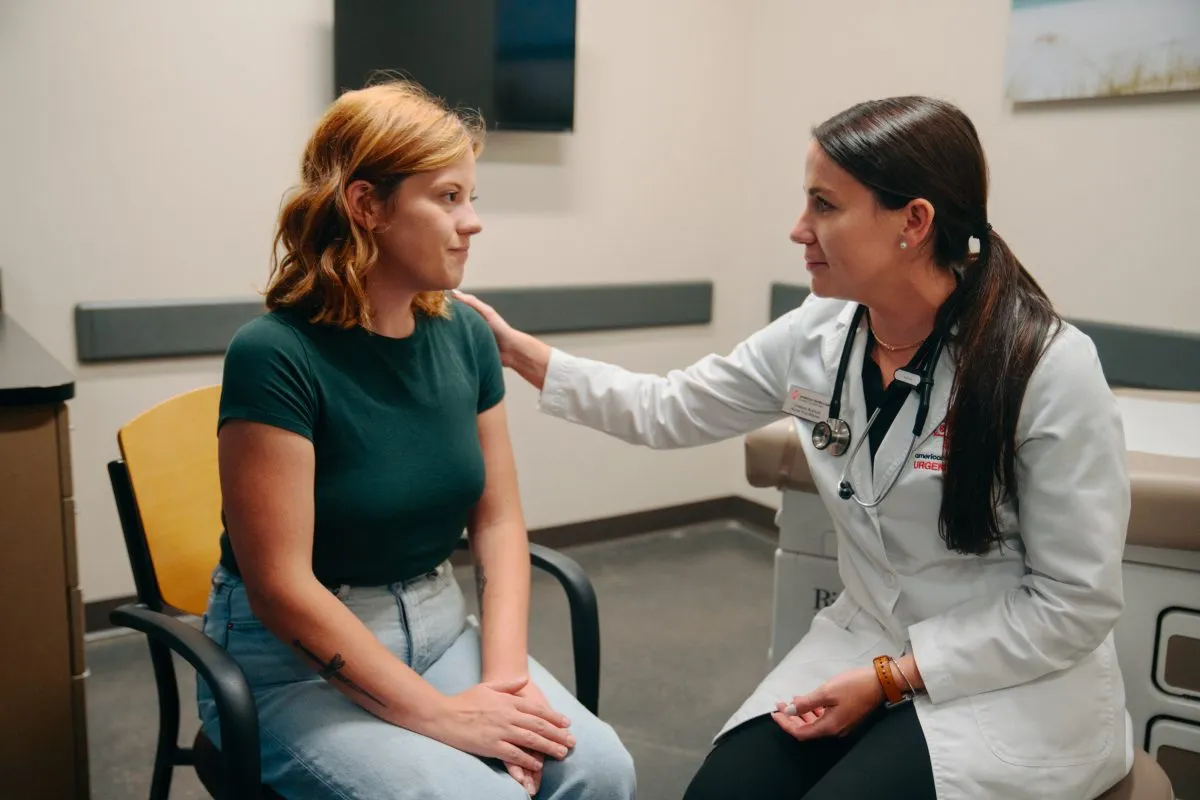Find The Location Nearest Covid-19 Testing
We think you’re located in zip code 80003. Not Right?
Arvada Confidential STD Testing Near Me
If you need convenient and private STD testing in Arvada, CO, we offer compassionate, confidential testing and treatment. No appointment necessary. Our walk-in clinic ensures privacy and respect for sexually transmitted diseases (STDs) in every step of your care.

Table of Contents ▼
- Does AFC Urgent Care offer STD Testing?
- What are Sexually Transmitted Diseases (STDs)?
- How do you get an STD?
- What are the most common STDs?
- Common STD Symptoms
- Should I get tested for STDs?
- STD Treatment and Prevention
- What is Chlamydia?
- What is Gonorrhea?
- What is Syphilis?
- What is HIV? Is HIV the same as AIDS?
- What is Trich or Trichomoniasis?
- What is Herpes?
- What are Pubic Lice?
- Is Hepatitis considered an STD?
Does AFC Test for STDs?
At AFC Urgent Care Arvada, we provide a wide range of STD tests to ensure comprehensive care for our patients. Our available tests include:
Our experienced physicians will conduct a thorough examination to determine the most appropriate tests for your situation. Depending on the required tests, we may need to collect blood, urine, or tissue samples. Most tests are covered by insurance, and for self-paying patients, we offer low-cost testing options and bundle pricing for a complete STD workup.
What to Expect During Your STD Test
The nature of your STD test will depend on what we are testing for. Some tests require a swab of the genital area or mouth, while others may require a urine or blood sample. Our team will explain each step and ensure your comfort and privacy throughout the process.
What are Sexually Transmitted Diseases (STDs)?
Sexually transmitted diseases (STDs) or infections (STIs) are more common than many people think. According to the Centers for Disease Control and Prevention (CDC), STDs such as chlamydia and gonorrhea are widespread, with significant rates reported across the United States. Understanding the nature of these infections and the importance of testing is crucial for maintaining sexual health.
How Do You Get an STD?
STDs are infections spread through sexual contact, including vaginal, oral, and anal sex. Regardless of your sexual history, orientation, or marital status, anyone who is sexually active is at risk of contracting an STD. Regular testing is a proactive step towards preventing and managing STDs, which is vital for long-term health.
Common STDs in Arvada
In Arvada and the Denver area, syphilis cases have risen by 18% from 2021 to 2022 and nearly tripled since 2017, posing severe health risks. However, gonorrhea and chlamydia rates have begun to stabilize or decline, though still higher than in 2013.
In the most recent reports from 2021, Jefferson County reported 1,513 cases of chlamydia, 584 cases of gonorrhea, and 85 cases of syphilis per 100,000 people. In Adams County it was reported that there were 2,916 cases of chlamydia, 1,052 cases of gonorrhea, and 126 cases of syphilis.
These trends highlight just how crucial it is to have accessible STD testing and treatment services to keep our community safe and healthy. That’s where our Arvada team steps in, providing confidential and safe STD testing to ensure you stay informed and protected.
What is Chlamydia?
Chlamydia is a prevalent bacterial infection that often shows no symptoms, making it challenging to detect without testing.
Chlamydia Symptoms
- Pain during urination
- Pain during sexual intercourse
- Abnormal discharge from the penis or vagina
- Bleeding between menstrual periods
If left untreated, chlamydia can lead to severe health issues, including pelvic inflammatory disease (PID) in women and epididymitis in men, both of which can cause infertility. Fortunately, chlamydia is treatable with antibiotics, so early detection and treatment are crucial.
What is Gonorrhea?
Gonorrhea is a bacterial infection that can affect various parts of the body, including the genitals, throat, and eyes.
Gonorrhea Symptoms
- Painful urination
- Abnormal discharge from the penis or vagina
- Increased vaginal bleeding between periods (in women)
Untreated gonorrhea can lead to serious health complications, such as pelvic inflammatory disease (PID) in women and epididymitis in men, resulting in infertility. Gonorrhea is treatable with antibiotics, underscoring the importance of prompt diagnosis and treatment.
What is Syphilis?
Syphilis is a multi-stage bacterial infection that starts with small, painless sores, typically on the genitals, anus, or mouth. If not treated, syphilis can progress to more severe stages.
Syphilis Symptoms
- Rashes
- Fever
- Swollen lymph nodes
Eventually, it can lead to serious health problems such as organ damage, neurological issues, and even death. Early-stage syphilis is easily treatable with antibiotics, making early detection and treatment vital to prevent long-term health consequences.
What is HIV?
HIV (Human Immunodeficiency Virus) damages the immune system by targeting and destroying crucial immune cells, making it difficult for the body to fight off infections and diseases. If left untreated, HIV can progress to AIDS (Acquired Immunodeficiency Syndrome), a more severe stage of the infection. HIV is primarily transmitted through contact with infected bodily fluids, such as:
- Blood
- Semen
- Vaginal fluids
- Breast milk
While there is no cure for HIV, antiretroviral therapy (ART) can effectively manage the virus, allowing individuals to live long, healthy lives and significantly reducing the risk of transmission.
What is Trich or Trichomoniasis?
Trichomoniasis, often referred to as “trich,” is a parasitic infection caused by the protozoan Trichomonas vaginalis.
Trich Symptoms
- Unusual discharge
- Vaginal itching and irritation
- Unpleasant vaginal odor
- Pain during urination and intercourse
However, many people with trichomoniasis do not experience any symptoms. The infection is easily treatable with prescribed medication, making testing and treatment important to prevent transmission.
What is Herpes?
Herpes is caused by the herpes simplex virus (HSV), which has two strains: HSV-1 and HSV-2.
- HSV-1: Typically causes oral herpes, resulting in cold sores around the mouth
- HSV-2: Usually causes genital herpes, leading to painful sores on the genital and anal areas
Herpes is highly contagious and can be spread through skin-to-skin contact, including kissing and sexual activities. While there is no cure for herpes, antiviral medications can help manage symptoms, reduce the frequency of outbreaks, and lower the risk of transmission.
What are Pubic Lice?
Pubic lice, also known as crabs, are tiny parasites that infest the pubic hair and skin around the genitals.
Pubic Lice Symptoms
- Intense itching
- Irritation in the affected area
Pubic lice can be seen as tiny, crab-like insects or their white eggs attached to hair shafts. They are usually spread through close physical contact, including sexual activity. Pubic lice are not dangerous and can be easily treated with over-the-counter medications designed to kill the parasites and their eggs.
What are Hepatitis B & C?
Hepatitis B and C are viral infections that cause inflammation of the liver, potentially leading to serious liver damage if untreated.
- Hepatitis B: Commonly transmitted through sexual contact and contact with infected blood
- Hepatitis C: Primarily spread through blood-to-blood contact, such as sharing needles
Hepatitis Symptoms
- Fever
- Fatigue
- Joint pain
- Dark urine
- Jaundice (yellowing of the skin and eyes)
Hepatitis B can be prevented through vaccination, while Hepatitis C is often curable with antiviral medications. Early diagnosis and treatment are essential to prevent severe liver complications.
Should I Get Tested for STDs?
Even if you don’t experience any symptoms, it’s important to get tested. Untreated STDs can lead to severe health complications, including infertility, cancer, and the transmission of infections to others. Pregnant women should be particularly vigilant, as some STDs can harm the baby during childbirth.
STD Treatment and Prevention
If you think you may have an STD, get tested as soon as possible. Some STDs can become serious if left untreated. While not all STDs can be cured, almost all can be managed with appropriate treatment, allowing you to live a healthy life. Treatment often involves antibiotics or antiviral medications.
STD Prevention Tips
- Using condoms during sex
- Limiting the number of sexual partners
- Regular screening for STDs
- Getting vaccinated for hepatitis A and B

 How Can We Help?
How Can We Help?
- PATIENT SERVICES
- COVID-19 SERVICES
- TELECARE
- EMPLOYER RESOURCES
- PATIENT RESOURCES
- ABOUT US
AFC Urgent Care FAQs
-
What will my STD test consist of?
That depends on what we’re ultimately testing for. Some tests include swabs of the genitals or mouth, while others require urine or blood tests.
-
What are the risks of leaving STDs untreated?
There are many different STDs, so the risks will depend on the disease. Cancer, infertility, transmission to sexual partners, and harm to unborn babies are a few risks of leaving STDs untreated.
-
Which STDs can AFC test for?
We’re able to test for some of the most common STDs including gonorrhea, genital warts and herpes, chlamydia, HPV, and more. Call your local clinic for a full rundown of the testing they can provide.
Don't wait to get the medical attention you need.
CALL US TODAY | (720) 502-0466